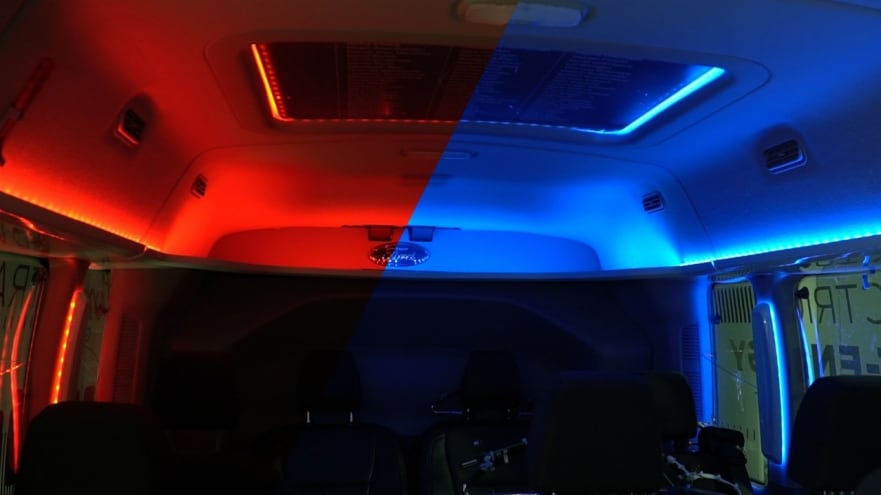COLOGNE, Germany, Dec. 9, 2019 – Experts claim colour choices can influence our mood, our responses, even how many likes we get on social media. Now Ford is exploring how matching the right colour to different driving situations could extend electric vehicle range.
The new battery-electric Transit Smart Energy Concept minibus uses ambient lighting to make passengers feel warmer (with red lights) or cooler (with blue lights). This helps take the strain from the aircon system so that energy saved can instead be used to cover more kilometres.
Research conducted by the National Renewable Energy Laboratory, in the U.S., shows that using the climate control system in a battery-electric vehicle can reduce the driving range by up to 50 per cent. Vehicles with larger cabins, such as minibuses, require more energy to maintain the interior temperature and ensure each passenger is comfortable.
“Our exposure to colour can change our mood in all sorts of ways. Here it is simply a case of using red ambient lighting inside the car to make people feel warmer and blue ambient lighting to make people feel cooler. Reducing the burden on the aircon could make a significant difference to extending vehicle range,” said Lioba Müller, lighting team engineer, Vehicle Architecture, Ford of Europe.
Ford tested its new 10-seater concept at the Weather Factory, Ford’s Environmental Test Centre in Cologne, Germany. Set up so that the driver can monitor the temperature status of all passenger seats from a centre console screen, passengers were subjected to a simulated winter’s day of 0° C, and a summer’s day of 30° C, and asked to rate their level of comfort based on feeling too hot or too cold. In both cases, the ambient lighting resulted in reducing the power usage of the climate system: by 3.3 per cent for cooling and 2.5 per cent for heating.
The Transit Smart Energy Concept features multiple innovations to optimise energy use and reduce heat loss:
- Six roof-mounted solar panels that charge a 12-volt battery for powering seat heating, cabin lighting and on-board electrical systems
- An innovative heat recovery system that utilises waste heat from the drivetrain components, the outside air and the air within the cabin to extend the vehicle range by 20 per cent
- Ventilated double-glazed windows that reduce cold contact surfaces and insulate against heat loss
- Insulated rear floor and roof that further reduce cabin heat loss
- A power sliding door that opens halfway to reduce heat loss. The heating, ventilation and air-conditioning blower is automatically turned off when the door is open
- A polycarbonate divider between the passenger door and seating area that further reduces heat loss as passengers enter and exit, and protects passengers from external element
The vehicle also features heated panels and seat heating which enable each passenger to control the temperature of their own area. Future versions are planned to enable the driver to control heating and cooling of individual seats – and deactivation of unoccupied seats that will be enabled by automatic passenger detection, inspired by existing airbag deployment technologies. Ford anticipates beginning road-trials with the Transit Smart Energy Concept later this year.
The research project is part of Ford’s commitment to offering an electrified option for every vehicle. Ford has announced that it is developing an all-electric version of its Transit van for Europe, anticipated for volume launch in 2021, while the company is the first manufacturer to deliver plug-in hybrid technology for zero-emission driving capability to the 1-tonne van segment, with the innovative new Transit Custom Plug-In Hybrid.
Transit already provides the basis for the Deutsche Post StreetScooter WORK XL electric van, produced at Ford’s European HQ in Cologne. Ford is also trialling Transit Custom Plug-In Hybrid vans in London, Cologne and Valencia, Spain, to better analyse the real-world benefits of such hybrid electric vehicles ahead of their market introduction in late 2019.
# # #

